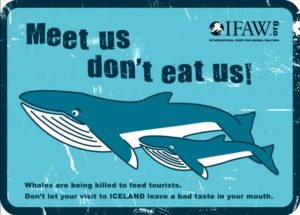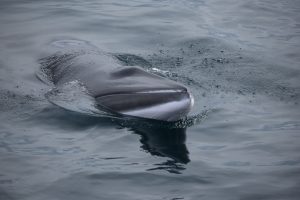Whaling in Iceland
Even in the oldest written literature of Iceland- the sagas of Icelanders, dating back to events in the 9th, 10th and 11th century, there are almost no accounts of whaling, except for some feuds between families about whale carcasses on the beach. Historically it were foreign countries that starting hunting whales commercially here (Basques, Norway, Danish, Dutch) in the 17th century. In the 18th century, it was mostly Frensh and US Whalers that hunted right whales further North. In 1883, the Icelandic government granted permission for Norway to build whale hunting stations in Iceland. By the early 1900s whale populations were depleted and Norwegian companies moved to the Arctic. Between 1895 and 1905 a total of 10,475 whales had been killed, mostly by Norwegian operators. It seems that Icelanders themselves never participated in the European commercial whaling of the seventeenth to twentieth centuries.
However, In 1948 an Icelandic company, Hvalur h/f, established a whale hunting station in Hvalfjordur (close to Reykjavik) and by 1975 killed on average 250 fin whales, 65 sei whales and 78 sperm whales each year, in addition to some blue and humpback whales. Most of the whale meat processed was exported to the UK, whilst meal was used as domestic animal feed. Until the end of the 20th Century Icelandic operations resulted in approximately 17,000 whales being killed within Icelandic waters. A whaling moratorium came into full effect in the year 1986 (that Iceland never formally accepted). From 1990 to 2003 no whale hunting took place in Icelandic waters. Whaling resumed in Iceland in 2003 after a 13-year hiatus. It was mostly Fin and Minke whales from there on.

Recent years
In Iceland’s last full season in 2018, 146 fin whales and six minke whales were killed. Fin whales are listed as endangered species and not even Norway or Japan hunt them. Fin whale meat products are exclusively exported to Japan as there is no domestic demand. But because Japan returned to commercial whaling in 2019 after withdrawing from the International Whaling Commission (IWC), even this demand for Icelandic whale meat has decreased dramatically.
Whaling was temporarily paused in Iceland between 2019 and 2021 as coronavirus restrictions, competition from subsidized Japanese whaling, and increasing domestic whale watching tourism have hampered the industry. There were two companies until 2020 when one of them stopped. This was the one hunting minke whales. Hvalur hf remains the only company that continues its whaling practices for the endangered Fin whales and is planning to continue operations in 2022. I saw them going out already. A weird feeling when you are on a whale watching boat and see a whaling boat headed out into the bay. Hvalur is operating outside of the Old Harbour, right here, where our whale watching tours start. Their ships are marked with an „H“ (Hvalur 8 and Hvalur 9).

Curious minke whale
Why Whaling?
Tourists visiting Iceland remain the largest consumers of (Icelandic) minke whale meat. A 2009 Gallup survey for IFAW (International Fund for Animal Welfare) found that 40% of tourists admitted to sampling whale meat: by 2015, this figure had fallen to 18% and by 2017, had dropped still further to 11.4%. Given that over 2.3 million tourists visited Iceland in 2018 and a further 2 million in 2019, it is incredibly important to reach all of you, who come to Iceland, with the message that whale meat is neither traditional nor a popular dish locally. In fact, in a 2018 Gallup poll for IFAW only 2% say that it is a regular on their plates, which means six times or more per year. 84% said they had never eaten it! Domestic demand by tourists is now covered by imports from Norway.
It is an undeniable fact that every whale killed is one fewer to be potentially enjoyed by whale watchers on tours, especially considering that all minke whales killed were previously harpooned close to the whale watching area in Faxaflói Bay. It must also have affected their behavior, as they still seem to be more shy and elusive than other cetacean species around the boats. Of course, we here at Special Tours, as a sustainable whale watching company have confronted the whaling companies and often spoke out publicly against the hunts.
What you can do about it
- Meet us, don´t eat us: Between 2009 and 2017, the number of tourists who said they tried whale meat dropped by 70%. Now less than 10% of the restaurants in Reykjavik offer whale meat, while more than half signed up to be “whale friendly”. Please only visit these ones, if you want to encourage change.
- Sign a petition to end whaling
- Be part of the movement that helps to stop whaling once and for all
- https://www.change.org/p/iceland-hvalur-ehf-stop-whaling-iceland
- https://www.sealegacy.org/pages/iceland-whaling
- https://www.ifaw.is/signup/
Some good news at the end: the Fisheries minister said that whaling no longer seems to be a profitable activity as demand dwindles. Therefore it seems likely that whaling might be stopped in 2024, when current licenses will expire. Hurray!








